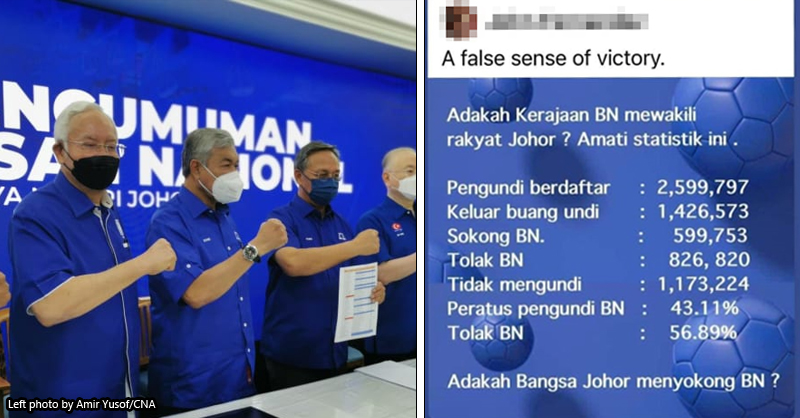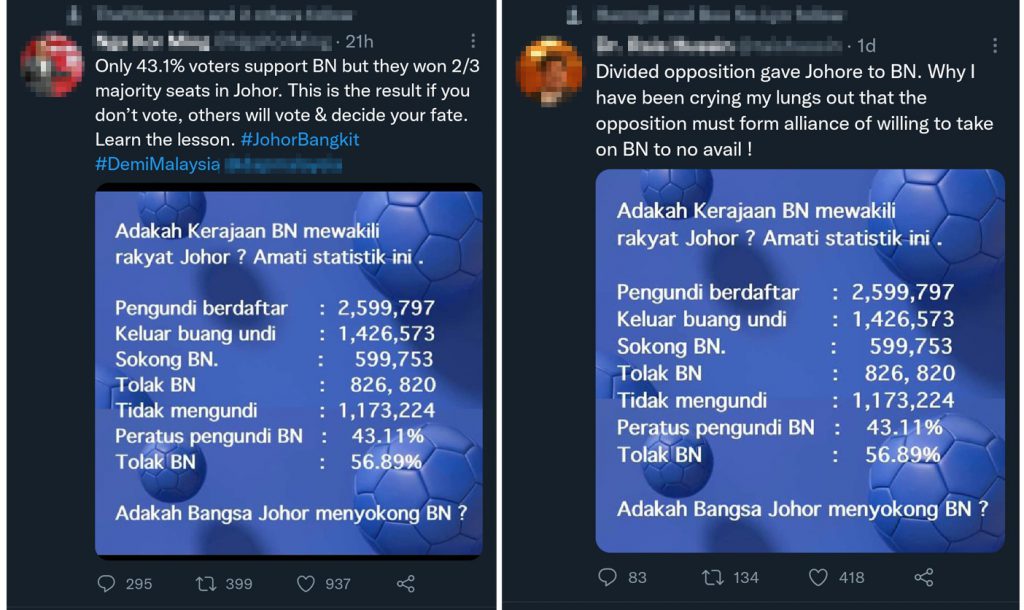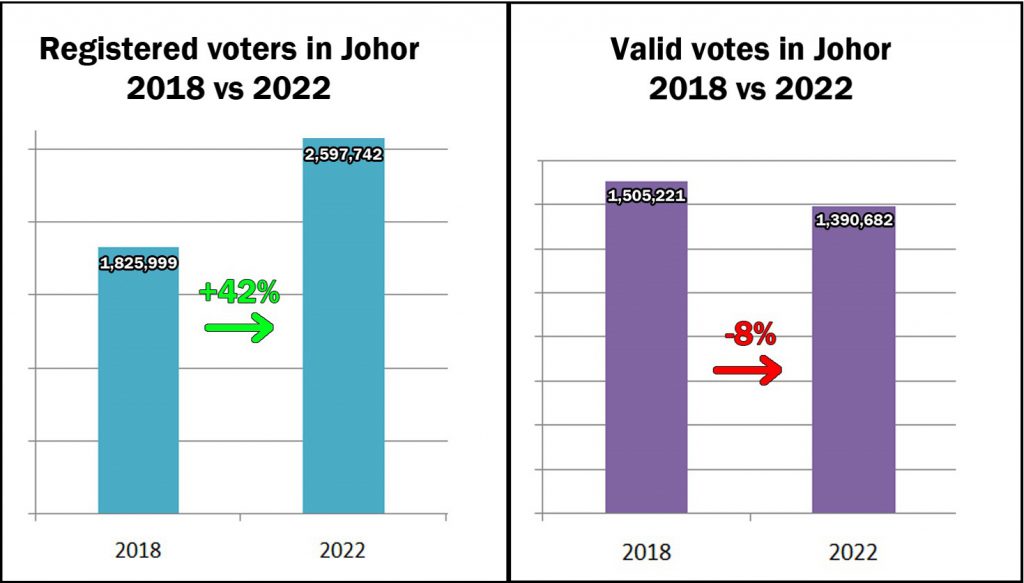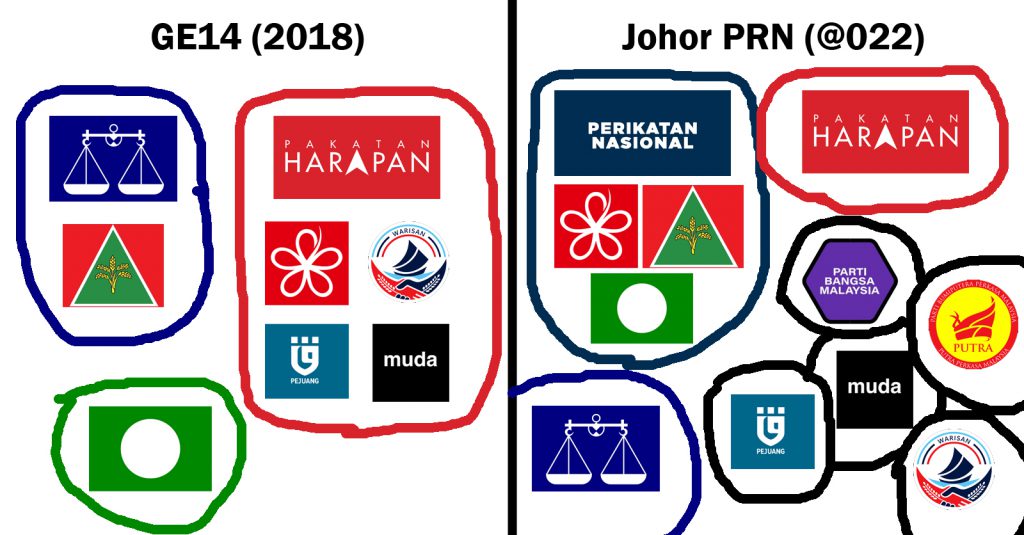Did BN win Johor because of low voter turnout? We look at the actual numbers.

- 420Shares
- Facebook380
- Twitter7
- LinkedIn7
- Email9
- WhatsApp17
In a move that’s hardly surprising, the by-election in Johor last weekend saw BN winning with a huge number of seats, obtaining 40 out of 56 seats they contested in. In the aftermath, you might have seen this image being shared about on social media, undoubtedly with captions that we can only describe as ‘salty’.

Based on the image and captions we found, it seems to imply that BN only won because of the low voter turnout, that a majority of the voters don’t even want BN, and had the opposition not decided to go their separate ways, they wouldn’t have lost Johor.
Now, this writer will state up front that he has no interest towards any political party, so it is with an unbiased mind that we put forth the question: is this really the case? Well, we pulled up some numbers from Astro Awani, Bernama, and an Evozi app site, did some crunching, and the first thing we noticed was that despite the abysmally low voter turnout…
In terms of actual number of voters, there’s not much difference from GE14
First we have to admit that the number we got don’t quite match up with the ones mentioned in the image, even after double-checking. But the difference isn’t that big. For example, the image says there are 2,599,797 registered voters in Johor, we got 2,597,742; a mere difference of 2,000 voters. We’ll be using the numbers we got ourselves, since we trust those more.
Anyway, the voter turnout for this by-election was been pretty low: only 53.5%, if we discount the undi rosaks and unreturned ballot papers. This is a lot lower than the turnout for Johor’s DUN elections for GE14, which is 82.4%. This could be because this by-election is the first one since Undi18 and automatic voter registration was implemented. But how much of a difference does that make?
Well, in 2018 (when GE14 happened), the registered voters in Johor number 1,825,999. In 2022 the number increased to 2,957,742, which is a 42.3% increase.
In 2018, the number of votes counted number 1,505,221. In 2022, 1,390,682 votes were counted, which is 114,539 votes less. That translates to an 8% decrease.

How much difference does 114,539 voters can make? It’s a bit unrealistic, but if we spread them out evenly over 56 DUN constituencies, that gives us an average of 2,045 extra voters per constituency. In Johor’s by-election, some seats are won narrowly with a difference of only 137 votes (N51 Bukit Batu – PKR’s win), while others are quite safe with a difference of 13,943 votes (N48 Skudai – DAP’s win).

There are only 14 seats where 2,045 extra votes might make a difference, and even then it’s not guaranteed that all the extra votes would go to one party. But assuming all the missing voters vote for the runner up, BN would gain 5 seats and lose 8, a net loss of three seats. Their win score would then be 37 out of 56 seats, still giving them two-thirds majority in the DUN.

So long story short, using idealistic calculations, the actual number of voters whose votes count aren’t wildly different from GE14, and even if this small difference causes a difference, BN will still most likely win.
On to the second finding…
Even if the opposition didn’t break up, BN might still be more popular
A lot had happened since 2018, but if we recall correctly, GERAKAN left BN and BERSATU left PH and formed the PN coalition with PAS, while PEJUANG, MUDA and WARISAN left PH and contested under their own banners for Johor’s by-election. PUTRA came into their own after BN’s GE14’s loss, and PBM seems to just… come out of nowhere. But to sum up:

The summary of valid votes obtained in Johor’s by-election is as follows:

Had everyone stuck to GE14’s arrangement, will BN still have the most votes? This is what happens when we returned GERAKAN to BN and BERSATU, PEJUANG, MUDA, and WARISAN to PH, with PSM added in for good measure:

BN still gets the most votes, although a bit more narrowly now. Of course, there’s a possibility that the number of votes may change if some of the parties contested under a coalition banner.
Going back to the logic used in the image that sparked this article – if 43.11% voted for BN, then 56.89% of Johoreans reject BN – then by that same logic, using our calculations, 74% of Johoreans reject PH, and 76% of them reject PN. But had they stayed in their previous coalitions, only 55% would reject PH, and 93% would reject PAS. There’s no point here, that’s just how first-past-the-post works: no matter how little votes you get, as long as you get more than the other candidates, you still win.
Now, with everything said and done, you might be thinking…
So… what do all these numbers tell us?

If we may risk the #IHateCilisos comments, we’d say that they don’t say much, just like that image that prompted this article in the first place. Both are ultimately meaningless, because at the end of the day, both focused on the numbers – the minor dents – instead of addressing the deep rot plaguing our country.
BN had won, the opposition took a beating, and not many people showed up to vote. That much we know, through the neat numbers that represent popular votes and majorities and voter turnouts.
But what they didn’t tell us is that BN won despite their poster child being a convicted criminal. That many of the opposition had their heads so far up their behinds that they can’t think of anything else. That voters are tired of the needless political drama that started four years ago and kept on going even through a deadly pandemic and a slowly drowning economy. And that none of these seem like it will end anytime soon, even though we’ve lost a big chunk of our lives enduring them.
If there’s a point to this article, it’s that voters are more than just numbers. They’re real people with real hopes behind their votes, and politicians have mocked those votes by turning it into a numbers game, be it by squandering them through cheap gimmicks and campaigns, or lamenting the low voter turnout when there’s no real reason for the people to vote.
Until politicians can really feel the weight behind each of the votes they so earnestly seek, Malaysian politics will remain meaningless in the people’s eyes.
- 420Shares
- Facebook380
- Twitter7
- LinkedIn7
- Email9
- WhatsApp17
